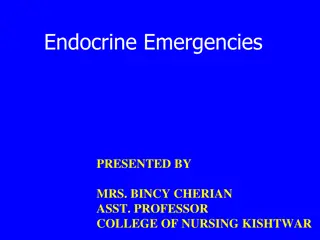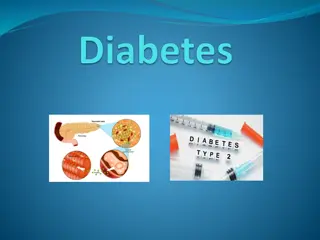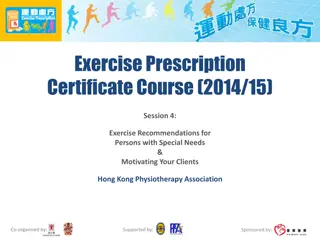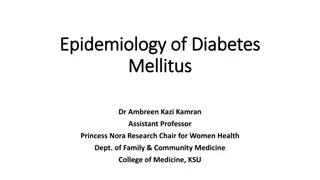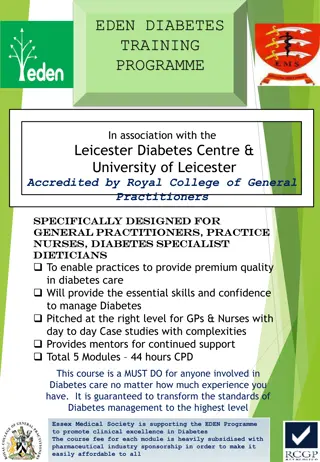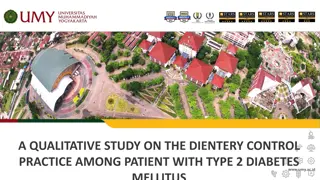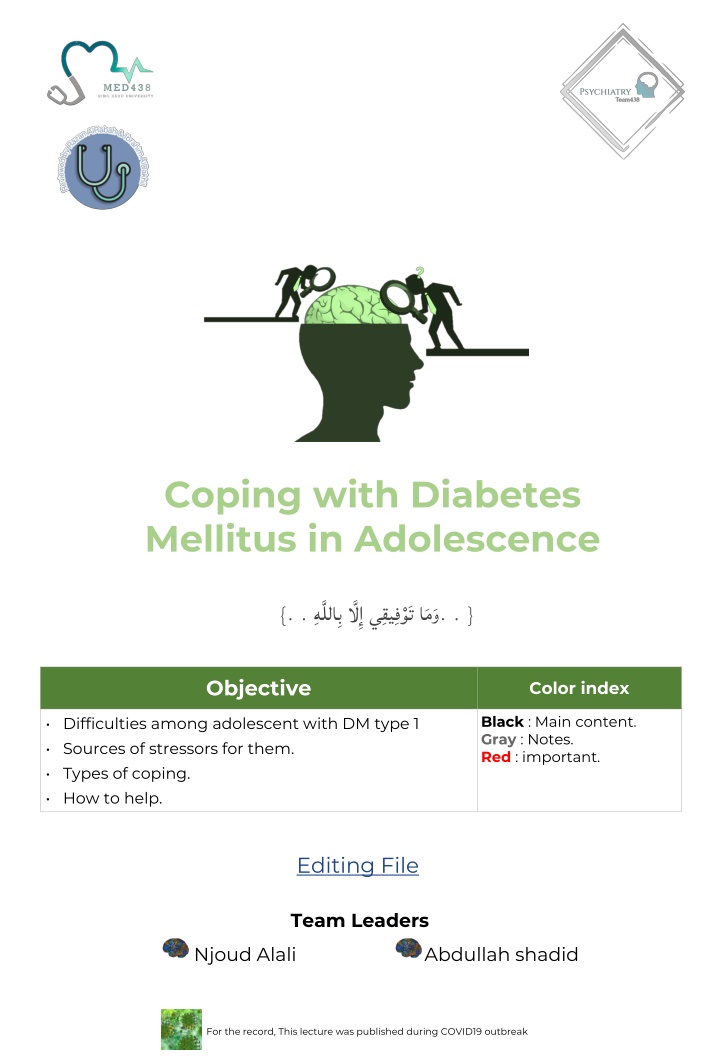
Coping Strategies for Adolescents with Diabetes Mellitus
Learn about the challenges adolescents with diabetes face, sources of stress, coping mechanisms, and how to provide support during this crucial stage of life.
Download Presentation

Please find below an Image/Link to download the presentation.
The content on the website is provided AS IS for your information and personal use only. It may not be sold, licensed, or shared on other websites without obtaining consent from the author. If you encounter any issues during the download, it is possible that the publisher has removed the file from their server.
You are allowed to download the files provided on this website for personal or commercial use, subject to the condition that they are used lawfully. All files are the property of their respective owners.
The content on the website is provided AS IS for your information and personal use only. It may not be sold, licensed, or shared on other websites without obtaining consent from the author.
E N D
Presentation Transcript
Coping with Diabetes Mellitus in Adolescence {. . . . } Objective Color index Black : Main content. Gray : Notes. Red : important. Difficulties among adolescent with DM type 1 Sources of stressors for them. Types of coping. How to help. Editing File Editing File Team Leaders Njoud Alali Abdullah shadid For the record, This lecture was published during COVID19 outbreak
introduction Adolescence can be a difficult period of life. The need to become more independent, to create an identity and to adopt a new lifestyle can influence the way that adolescents with diabetes cope with their disease The freedom to makes one s own choices about lifestyle is seen as important in this age group. Taking increasing responsibility for diabetes self-care is part of the process adolescence and sources of stress Early adolescence Mid-adolescence Late adolescence - (17-older yrs.) - Future oriented - intimacy - career goals - (14-16 yrs.) - Independence - self image -(11-14 yrs.) Am I normal? Types of Diabetes Mellitus Type 1 Type 2 Insulin dependent DM 5-10% Childhood Non Insulin dependent DM increased about 4 folds (last 30yrs) 8.5 % Age usually more then 18 years Facts about Type I patients: 80%, Unhygienic administer 58% , Wrong dose 77%, Glucose level (Test/interpret) 75% , Foods ( type / regular ) Treatment Lifestyle Active Weight Drugs Early diagnosis Insulin Vs. OH Blood pressure control Blood lipid control Psychosocial Factors and Diabetes (important) its play an important role in the course of illness Stress sometimes changes a latent case of diabetes into an active one. Psychological factors may precipitate the onset of diabetes and influence the timing of symptoms presentation It has been established that there is an excess of life events in the few months preceding the onset of the condition particularly in older children & adolescents. Psychological dysfunction may cause recurrence of acute diabetic episode specially in adolescents. Life experience and emotional factors can have an important bearing on the course of diabetes. Diabetes and Comorbidity Psychological morbidity appears to be from 10 30 % with chronic illnesses. Diabetes mellitus is co-morbid with : most commonly Anxiety disorders then depression Other co-morbid behavioral & psychological problems: -Anger - Adjustment disorders - Social withdrawal- Acute organic brain syndrome - Low self esteem - Behavioral problems - Eating disorders
Difficulties that they face Diet restriction. Always the same food and diet Frequent blood testing & injections. Dependency on family. (difficulty in developing independence) (most important) Isolation from peers. And their relationships with peers Physical limitations. They feel they can t play and workout. Parents can t differentiate between Common anxiety Symptoms of temperament AND hypoglycemia. body image issues What factors affect types of adjustment ? Personal strength & interpersonal skills. Child temperament family influences on coping Peer group influences on coping Feelings and attitudes about how they cope Quality of life and how this affected coping Personal meaning of illness Fear for the future and how this affected coping. Effects of stress - There are negative impact of everyday stressors on health , immune and circulatory system Other effects : Children & adolescents with diabetes show an increased rate of learning problems. Cognitive impairment on intelligence scales have been noticed. School absence. The majority of school personnel has inadequate understanding of diabetes and its management. Sources of stress in DM The illness itself. Illness-specific stressor such as: Disease-related pain. Medical procedures Stress related to admission. Extreme self control ( diet) Psychological stress Difficult to alter lifestyle behaviors Pressure to eat Medical information seen as advisory Asymptomatic ( thinks he doesn t have the disease ) Coping It is The process of managing stressors (internal and external ). Coping of adolescents with chronic illness focus on coping with illness itself Types Interactive model : coping moderates the impact of stressor to varying degree depends on severity of stressor. Additive ( main ) effect model which focus on well-being regardless amount of stress. 5 Stage Denial Anger Bargaining Depression Acceptance How to help Parent support. Cognitive coping ( understand how the insulin help to grow stronger ) Behavioral coping ( minimize the experience of being deprived from popular food ..) Coping with Symptoms of Depression. Psychosocial Aspects of Management Most of youngsters with diabetes and their families will cope well with the social and psychological stresses imposed by the illness. Education When to refer the patient to a child and adolescent psychiatrist? School counseling Individual psychotherapy Family counseling Managing psychiatric disorders
Very important notes you can skip all the lecture and read this only its enough in the course of illness psychological factor is very important anxiety is the most common psychiatric disorder associated with DM, depression is the second Dependency is the most common difficulty they face Best way of coping is coping with the disease itself Quiz Answers Key! 1.D 2.C 3.D 4.C 5.B 6.C 1) Which one of the following a DM patient face? A. Frequent blood testing B. Diet restriction C. Peers Isolation D. All Choices 2) Psychological morbidity appears to range from? A. 1-5% B. 20-50% C. 10-30% D. 3-4% 3) What is the best way of coping in a child with type 1 diabetes? A. Diet restriction B. Bargaining C. Parent counseling D. Coping with illness itself 4): What is the most common disorder associated with diabetes in adolescents? A) Schizophrenia B)Depression C) Anxiety D)Anorexia nervosa 5) Sources Of Stress And Worries In Mid-Adolescence? A. Career goal B. Self image C. Future oriented D.Intimacy 6) which one of the following Psychosocial Factors is TRUE in regards to Diabetes ? A. Stress does not changes a latent case of diabetes into an active one. B. no relation between Psychological factors and the onset of diabetes C. May cause recurrence of acute diabetic episode D. Life experience and emotional factors are not important Good luck!







